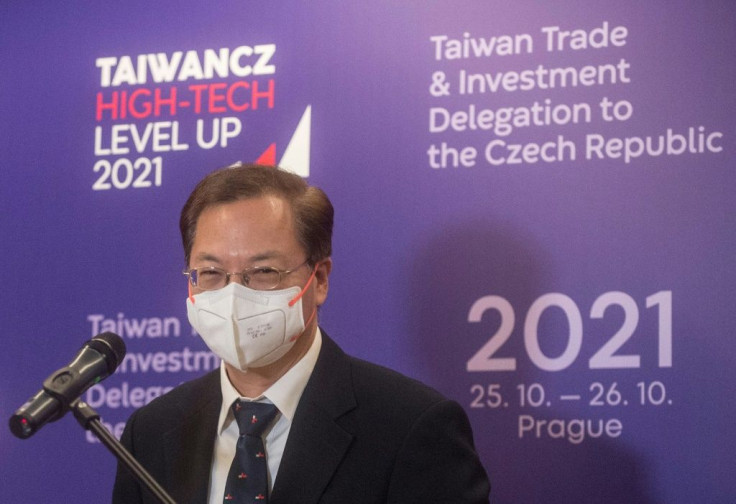Taiwan On Charm Offensive In Europe As China Stumbles
Tensions have been flying high between Taiwan and China just as a Taiwanese delegation is visiting central and eastern Europe to boost business ties in a region also targeted by Chinese investors.
The 66-member delegation on a tour of Slovakia, the Czech Republic and Lithuania has signed 18 memorandums of cooperation in the three countries.
Taiwan's charm offensive in the region once oppressed by Soviet-led Communism has targeted industrial innovation, research and development, as well as the space industry and internet security.
The trip has angered China, already dismayed over Lithuania's decision earlier this year to pull out of the 17+1 cooperation forum of China and regional states and then allow the opening of a Taiwan representative office.
"The political elite of many countries in the region (has) been in contact with Taiwan since the liberation of the entire region from Soviet communism," said Vilnius University analyst Konstantinas Andrijauskas.
He added that within the "geopolitical competition" between China and Taiwan in the region, Taiwanese investment was more predictable and independent of political will.
China is a wealthier investor, but its problem is that it "wants to invest in sectors which are regarded as sensitive for national security in most NATO countries," Andrijauskas told AFP.
China's investment pledges have also been stumbling on cumbersome delivery in the region.
During Chinese President Xi Jinping's visit to Prague in 2016, Czech President Milos Zeman, his ally, promised massive Chinese investment in his country.
"They have promised a lot and delivered much less," said Lukas Martin from the Czech Confederation of Industry.
"Chinese investment rather targets non-industrial segments, sports teams, real estate, and it creates fewer jobs and added value," he told AFP.
Chinese companies own the Slavia Prague football club, the media company Medea Group, the engineering firm ZDAS and several buildings in Prague, as well as the Changhong consumer electronics producer.
Taiwan has in contrast targeted industry -- including electronics with its Foxconn plants -- and creates jobs.

In Slovakia, Taiwan's foreign minister Joseph Wu in a speech on Tuesday spoke of the potential for cooperation in the automotive industry -- the backbone of Slovakia's economy.
The Czech government's investment agency CzechInvest has mediated around the same number of investment projects by Taiwanese and Chinese companies -- around 30 for each by 2019, said Martin.
"But Taiwan's investment has created about eight times more jobs and its value is about 60 percent higher than that of the Chinese investment," he said, adding Taiwanese plants also generated profits for smaller Czech sub-suppliers.
The recent visit is a thorn in China's side as the country is trying to keep Taipei isolated on the world stage and prevents any sign of international legitimacy for the island.
Its Prague embassy slammed "the reckless establishment of contacts between some Czech institutions and officials and Taiwan's authorities, and their rough interference in China's internal affairs" in a statement issued this week.
But with Taiwan's proclaimed plans to move its businesses from China to safer territories including Europe, the EU seems to pay little attention.
Even though the EU as a whole acknowledges the One-China policy, the European Parliament last week urged closer ties between the bloc and Taiwan, slamming China for its treatment of the island.
A group of French senators visited Taiwan earlier this month to give it a boost, while a Slovak delegation is due to travel to Taiwan in December.
"We are not violating anything when we develop our cooperation with Taiwan," said Czech senate speaker Milos Vystrcil, who led a delegation of about 90 Czech politicians, entrepreneurs, scientists and journalists to Taiwan last year.
Both politicians and analysts, however, insist it would not make sense to sever ties with China.
"The country is important for our investors so we can't neglect it," said Martin. "But, on the other hand, we must not lay too much stress on it either."
© Copyright AFP 2024. All rights reserved.







